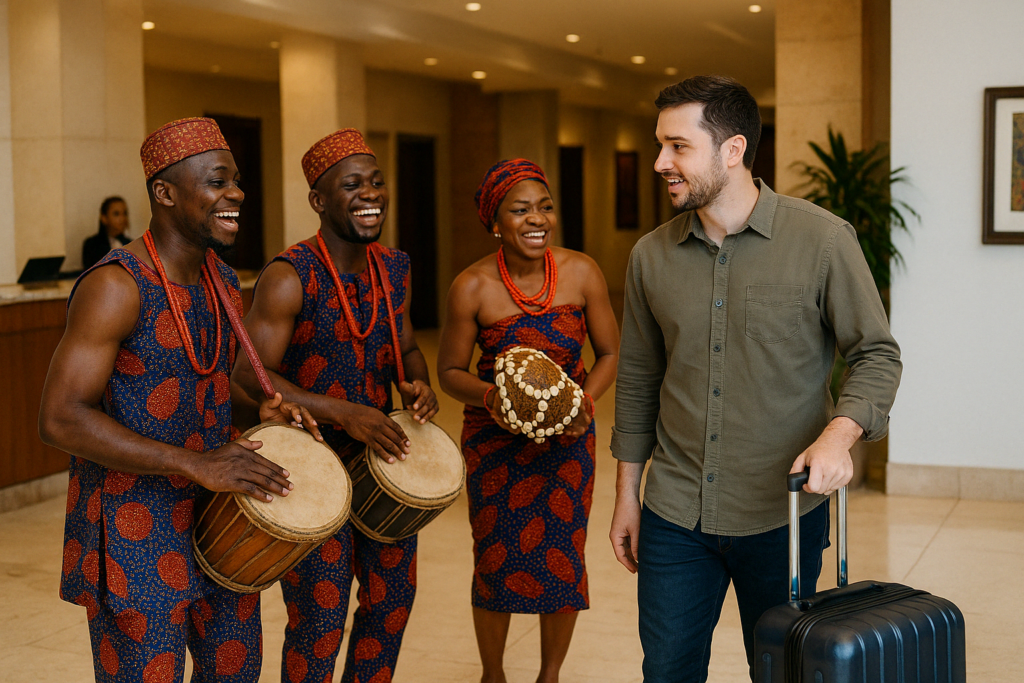From Suya at Check-In to Yoruba Welcome Songs:

Hospitality in Nigeria is not just an industry — it’s a lifestyle. Whether you’re stepping into a luxury hotel in Lagos, a cozy guesthouse in Calabar, or a serviced apartment in Abuja, there’s something unmistakably warm and deeply cultural about the way Nigerians welcome guests. It’s in the wide smile that greets you at the front desk, the aroma of jollof rice wafting from the kitchen, or the unexpected “Ẹ kú abọ” (Welcome) written boldly on a digital welcome board. Nigerian hospitality has a rhythm, a soul — and it’s one of the most unforgettable parts of visiting or traveling within the country.
A Culture of Welcome From the ancient traditions of the Igbo, Hausa, Yoruba, and other ethnic groups, the act of welcoming a guest has always been sacred. Hospitality is not transactional; it’s communal. In many homes and communities, guests are seen as a blessing — and this culture has organically found its way into modern-day hospitality services. Hotels and apartments across Nigeria are learning that blending traditional charm with modern service leaves a lasting impression. Travelers, both local and international, are loving it.
Local Touches That Make All the Difference Here are some of the ways Nigerian hospitality is standing out:
1. Welcome with Suya or Jollof Imagine walking into your serviced apartment after a long day and being welcomed with a plate of hot suya and a chilled zobo drink. It’s not uncommon. Some boutique hotels now offer local food tastings at check-in — a refreshing twist to the usual cold towel and juice.
2. Language of Home Instead of robotic greetings, some hotels are training their staff to say “Welcome” in local languages. From Nnọọ (Igbo), Sannu da zuwa (Hausa), to Ẹ kú abọ (Yoruba), these little linguistic touches instantly make guests feel at home.
3. Culturally Themed Rooms
Afrocentric decor is becoming a trend. Rooms now feature local artworks, Ankara fabric pillows, wooden carvings, woven mats, and bead-patterned lighting fixtures. It’s like sleeping in a space that tells a Nigerian story.
4. Live Cultural Entertainment. Some hotels, especially in tourist-heavy areas like Cross River and Osun states, host live drumming sessions, welcome dances, and cultural nights where guests can immerse themselves in local music and folklore.
5. Modern Meets Traditional: The New Face of Hospitality Many serviced apartments and hospitality platforms are adopting tech-driven booking systems, cashless payments, and mobile check-ins — but the human element remains strong. And it’s this balance that is winning hearts.For travelers used to generic, sterile hotel experiences, Nigerian hospitality offers warmth and personality. Whether it’s a lodge manager in Ilorin who insists on giving you extra pepper soup because “you look like you need it,” or the hotel housekeeper in Enugu who checks if you want native soup instead of the regular menu — it’s hospitality, Nigerian style.
A Call for More Local Flavor in Hospitality
As tourism in Africa grows and the hospitality space becomes more competitive, hotels and apartments in Nigeria can stand out by embracing their roots. It’s not just about international standards; it’s about cultural excellence.
The traveler of today wants a story, a moment, a connection. And Nigerian hospitality, when done right, offers exactly that — with spice, rhythm, and plenty of heart.